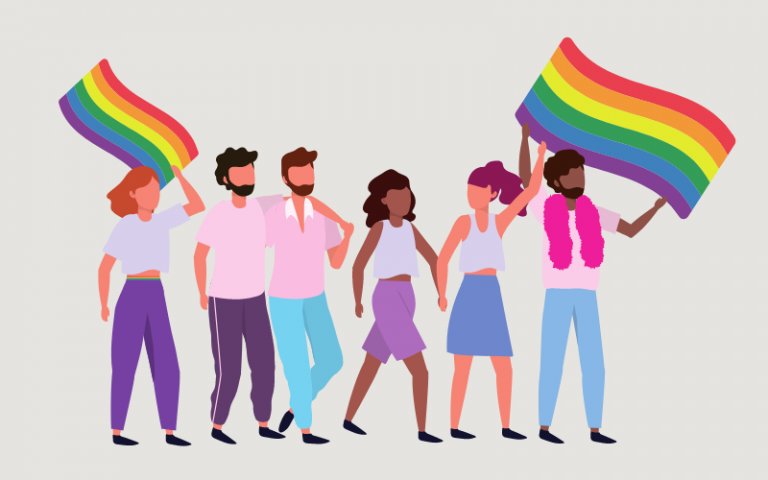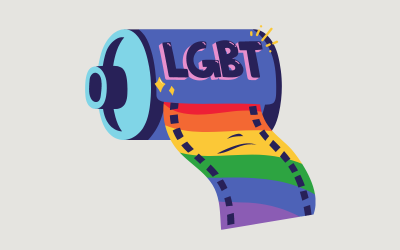A collection of resources relating to LGBT issues in the SSEES region.

To recognise LGBT+ History Month (February), we have compiled a list of readings, videos and resources which focus on LGBTQ+ issues in the SSEES region, as recommended by our staff. Any suggestions can be sent to Patricia Gabalova (p.gabalova@ucl.ac.uk)
Belarus
- Delo_Pi (Set up in memory of Mikhail (Misha) Pishchevsky, who was killed in a brutal homophobic attack in 2015)
- In Belarus, fighting for democracy — and LGBTQ rights (Article, POLITICO 2020)
‘Better to be a Dictator than Gay’: Homophobic Discourses in Belarusian Politics (Article, Europe-Asia Studies 2021)
Bulgaria
- Glass Foundation (NGO working towards equality for LGBTQ+ community in Bulgaria)
- Pride (Short film, 2013)
- Garth Greenwell on his debut novel (Interview with American author Gareth Greenwell, who wrote one of the first gay novels set in Bulgaria, The Guardian 2016)
What Belongs to You: Garth Greenwell (This book tells an unforgettable story about the ways our pasts and cultures, our scars and shames can shape who we are and determine how we love, 2016)
Poland
- Queer lives in interwar Poland (Interview, 2021. A young historian is uncovering stories of queer people living in interwar Poland)
- All our Fears (Film, 2021. Daniel, an artist, Catholic and activist, decides to crack down on the homophobia of the local community)
- Operation Hyacinth (Film, 2021. Not satisfied with the result of a murder investigation in Warsaw’s gay community, an officer in 1980s communist Poland resolves to uncover the truth)
- Anthology of Queen Polish Literature (Book, 2021)
Romania
- Queer Romanian Literature (Article, 2019)
- Mozaiq (LGBTI organisation in Romania)
- Orange Milk (Short film, 2010. The story of two friends whose relationship is built around the obsession for voyeurism and for each other).
- Soldiers. Story From Ferentari (Film, 2018. Adi (40), a young anthropologist, recently left by his girlfriend, moves to Ferentari in Bucharest with the desire of writing a study on pop music of the Roma community)
- Love sick (Legături bolnăvicioase) (Film, 2006. As a casual friendship between two students blossoms into a tender young romance, a fit of unnatural jealousy threatens to tear them apart)
- Several conversations about a very tall girl (Film, 2018. As their relationship evolves, two very different women share stories about a lover they had in common as they reconcile perspectives on life and love)
- Remy Bonny: LGBTS rights in Romania (Podcast, 2020)
Slovenia
- Four voices (Slovenian lesbian literature)
- Lambda & Vizibilija (LGBT+ publishing)
- Brane Mozetič (Brane Mozetič (1958) is a Slovenian poet, writer, editor of the Aleph and Lambda book series and translator from French)
- An interview with Brane Mozetič (2020)
- Suzana Tratnik (Suzana Tratnik (1963) is a Slovenian writer, translator, essayist and lesbian activist)
- Tracing the Unspoken (A poetry collection by Milan Šelj (1960), Slovenian poet and translator who lives and works in London since 1992)
- LGBT Film festival (The oldest LGBT film festival in Europe)
- Consequences (Film, 2018)
- Guardian of the Frontier (Film, 2002)
- History of Gay and Lesbian Movement in Slovenia, 1984-2022
- How one underground party night changed Ljubljana – and Yugoslavia – forever (Article, 2021)
- Go East! LGBTQ+ Literature in Eastern Europe (Conference volume, 2020)
Russia
- Contemporary Queer Art and Activism in Russia (Event, 22 February 2022)
Films and series

Very few Russian fiction films even hint at the existence of lesbian relationships. Some that may be felt to explore same-sex love and desire between women, whether implicitly or explicitly, are listed below. Many are held in SSEES’s Bain Graffy Film Collection and most have English subtitles. Members of UCL can watch them in SSEES library by asking at the issue desk for the relevant call number (UCL ID card required).
- Strana glukhikh (Land of the Deaf, Valerii Todorovskii, 1998, Russia), in which the two female leads joke about being mistaken for a lesbian couple. Library call number DVD-44.
- Dnevnik ego zheny (His Wife’s Diary, Aleksei Uchitel´, 2000, Russia), winner of both that year’s Kinotavr Grand Prix and the 2001 Nika main prize. Set in the South of France in the 1940s and based on a screenplay (by Avdot´ia Smirnova) about the émigré writer Ivan Bunin and his relationships with his wife, his young lover, and the poet Galina Kuznetsova, the latter of whom leaves Bunin for the singer Margo Kovtun. Library call number DVD-45.
- Vdokh–Vydokh (Inhale–Exhale, Ivan Dykhovichnyi, 2006, Russia), about a husband and wife whose marriage is destroyed by the wife’s lesbian affair. Library call number DVD-5515.
- Zhestokost´ (Cruelty, Marina Liubakova, 2007, Russia), a Thelma & Louise (Ridley Scott, 1991, United States) type tale that charts the developing relationship of two women, a teenager and a businesswoman in her thirties, which increasingly has sexual overtones and culminates in the teenager’s (unrealised) suggestion that they become lesbians. Library call number DVD-1742.
- Kokoko (Avdot´ia Smirnova, 2012, Russia), a female buddy film about the relationship between Liza, a St Petersburg ethnographer and Vika, a restaurant hostess from Ekaterinburg (although the director has insisted that the women’s relationship is not erotic). Library call number DVD-3478 and on the production company’s YouTube channel.
- Intimnye mesta (Intimate Parts, Natasha Merkulova and Aleksei Chupov, 2013, Russia), in which a woman who finds out that her boyfriend is cheating on her has sex with her housemaid. Library call number DVD-3780.
- Dylda (Beanpole, Kantemir Balagov, 2019, Russia), which explores life in Leningrad after the Second World War through the story of two women who fall in love. Partly based on Svetlana Aleksievich’s The Unwomanly Face of War (U voiny ne zhenskoe litso, 1985), the film was nominated for the Queer Palm at the 2019 Cannes Film Festival. Library call number DVD-6037 (see p. 78 of pdf).
- DAU. Katya Tanya (Ilya Khrzhanovskiy and Jekaterina Oertel, 2020, Germany, Ukraine, United Kingdom, Russia, 18+), part of the vast DAU project. Set in 1942 and 1952-1953, this film tells the story of Katya, a librarian, who, after several disastrous affairs with men, begins a sexual relationship with a woman, a journalist named Tanya. Predictably, this comes to the attention of the First Department, with horrifying consequences.
Lesbian themes are also explored in some Russian web series. Steklo (The Glass, Evgeniia Maksimova, 2013, Russia) focuses on six twenty-something lesbians who live in Moscow and have quite different lifestyles. According to its makers, the series aims to destroy and partly ridicule the stereotypes of the lesbian subculture (the first and second episodes of series one are on YouTube). Eto proiskhodit riadom s vami (This Is Happening Right Next to You, Iuliia Fil, 2014–, Russia) celebrates St Petersburg as a place of exceptional freedom for lesbians and features non-professional actors. Many sequences were shot in St Petersburg’s ‘girls-only’ nightclub Infinity. Series One is on YouTube.
Videos
Further resources
- SSEES Library offers a wide selection of resources on LGBTQ+ in Eastern Europe
- Click here for more information about LGBT+ History Month events and activities taking place across UCL
- Straight Talk with Gay people (YouTube channel)
 Close
Close

